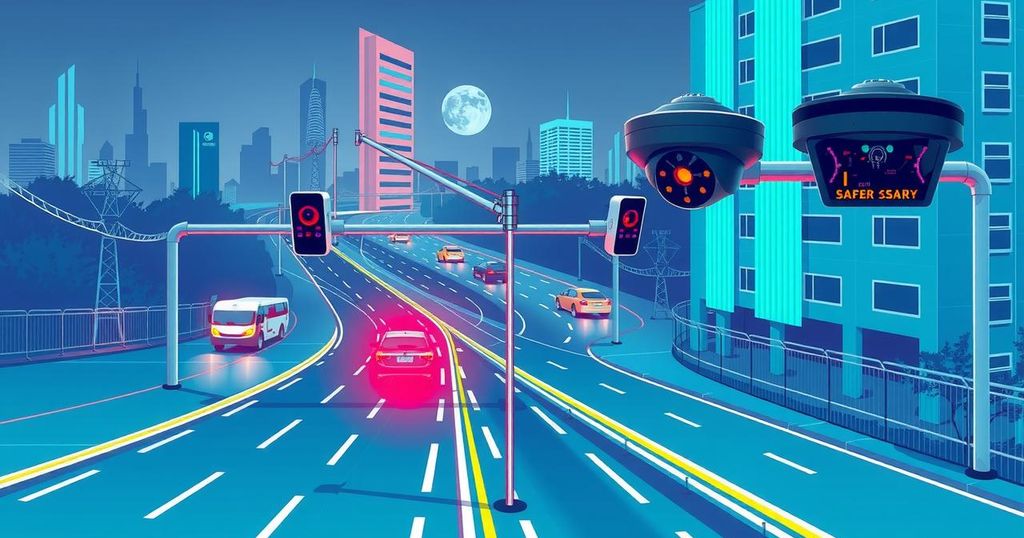AI Research at ASU Drives Innovations in Road Safety
Arizona State University researchers, led by Yezhou Yang, are innovating in road safety with the development of eTraM, an event-based traffic monitoring system that collects crucial road data while respecting personal privacy. Yang’s team is also collaborating with city planners to enhance traffic safety and guide urban design. Kamil Kaloush is working to raise awareness about AI’s role in traffic safety. The research is making real strides toward safer streets for everyone.
Driving may feel like a mundane part of our lives, but let’s face it, it can also be terrifying. Road traffic collisions are the leading cause of death for both children and young adults globally. In a world on the brink of autonomous vehicles hitting the mainstream, researchers at Arizona State University (ASU) are ramping up efforts to discover safer roads for everyone.
At the forefront of this exciting research is Yezhou “YZ” Yang, an associate professor in the School of Computing and Augmented Intelligence, which is nestled within the Ira A. Fulton Schools of Engineering at ASU. Yang is a big name in computer vision, a field of artificial intelligence that allows machines to perceive the world using sensors and cameras. His work is not just cutting-edge; it has the potential to save lives.
Yang’s team has rolled out an innovative traffic monitoring system known as eTraM, which is redefining how we gather and utilize road data. This system goes beyond what traditional traffic cameras can do, gathering detailed information on variables like weather and lighting conditions for up to ten hours at a time. Importantly, it places a strong emphasis on privacy, recording data without capturing identifiable images of individuals.
According to Yang, “The cities of the future must address concerns about personal privacy and security. eTraM records data and not images, providing information that can help train AI models but doesn’t use anyone’s image without their knowledge.” The project is already gaining traction, with cameras around the ASU campus gathering crucial data to pinpoint risky driving areas, particularly after dark.
Next up, Yang’s team, along with Fulton Schools Assistant Teaching Professor Bharatesh Chakravarthi, is developing machine learning models to enhance eTraM’s functionality. The insights gained through this innovative system aim to assist city planners in creating safer intersections, optimizing traffic signals, improving signage, and designing better roads altogether.
Getting this technology into the hands of city officials is a key part of the mission. Kamil Kaloush, the FORTA Professor of Pavement Engineering, is working tirelessly to highlight how AI can be leveraged to boost traffic safety. “ASU is an IRF Global university member, and we support the organization with various requests for training and benchmarking,” he emphasizes.
In April, the team conducted a workshop dubbed “AI and Big Data Applications for Future Traffic and Incident Management” in the UAE, organized by Abu Dhabi Mobility alongside IRF Global. This two-day event fostered a vibrant exchange of ideas among government officials, transport authorities, researchers, and tech leaders, particularly focusing on real-time analytics for traffic management.
Participants were not just passive listeners; they engaged directly with AI technology, learning how to develop and train their custom models. The ASU team has plans to expand the workshop to more locations in the future. Discussions are also underway with Phoenix officials regarding a similar upcoming event aimed at applying this technology in local communities.
Yang is positive about the effect of innovations like eTraM and these educational workshops, asserting that the ultimate goal is enhancing safety on the streets. “Now it’s back to work. No pit stops!” he quips, revealing the determined spirit fueling this initiative. With leaders like him steering the charge, the safe future of transportation appears not just promising — it’s well on its way.
In the realm of technology and science, this research goes beyond traffic safety. From AI-driven smart medicine to 3D printing innovations, ASU is making measurable impacts, mapping out a future where technology intertwines seamlessly with our daily lives. And the journey has only just begun!
The ongoing research at Arizona State University is pushing the envelope in road safety, particularly as we approach a future of greater autonomy in vehicles. Innovations like eTraM aren’t just about technology; they’re about protecting lives by prioritizing personal privacy while collecting valuable data. With workshops and collaborations aimed at sharing AI developments with city planners, the future of safer streets seems promising indeed. Yang and his dedicated team exemplify how academic research can translate into meaningful real-world solutions, making the roads not just safer, but smarter too.
Original Source: news.asu.edu




